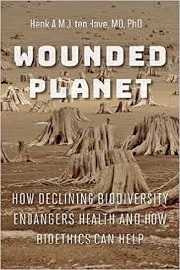Wounded Planet: How Declining Biodiversity Endangers Health and How Bioethics Can Help

Henk A M J ten Have
Johns Hopkins Press, £48.00
The relevance of the environment to health is clearest in situations such as natural disasters and famines, but the connection holds more widely. Everyone’s health is influenced by the quality of their natural environment, nutrition, education and hygiene; our health is determined more by the conditions of everyday life than by medical treatment and healthcare services.
Mainstream bioethics often addresses the care and autonomy of individual patients without considering the social and environmental conditions on which their health depends. Wounded Planet instead argues that we need to bring medical ethics and environmental ethics together to create global bioethics, which covers medical, social and environmental concerns. Biodiversity and human health should be considered together, alongside the wellbeing of future generations.
Wounded Planet reviews the key topics that global bioethics must address, including health, food and water. In many cases the description is overwhelmingly about social structure rather than biodiversity. Such discussions are fundamental but, although the book’s tagline starts ‘how declining biodiversity endangers health’, biodiversity was at times peripheral to discussions. Instead, the book is a call to reassess neoliberal values and challenge the promise of markets and technology to fix problems. Ten Have highlights the need to tackle problems at their root cause, and to ask what kind of world we want to live in and leave for future generations.
The important dilemmas highlighted by Wounded Planet include whether we should drain swamps or use pesticides to reduce vectors of disease even if these measures may reduce biodiversity, with potential longer-term health impacts. In order to answer questions where biodiversity conflicts with human health, ten Have touches on the topic of whether nature has intrinsic value. However, this is not explored sufficiently to shed light on how different perspectives would lead to particular answers.
Dr Rebecca Nesbit


